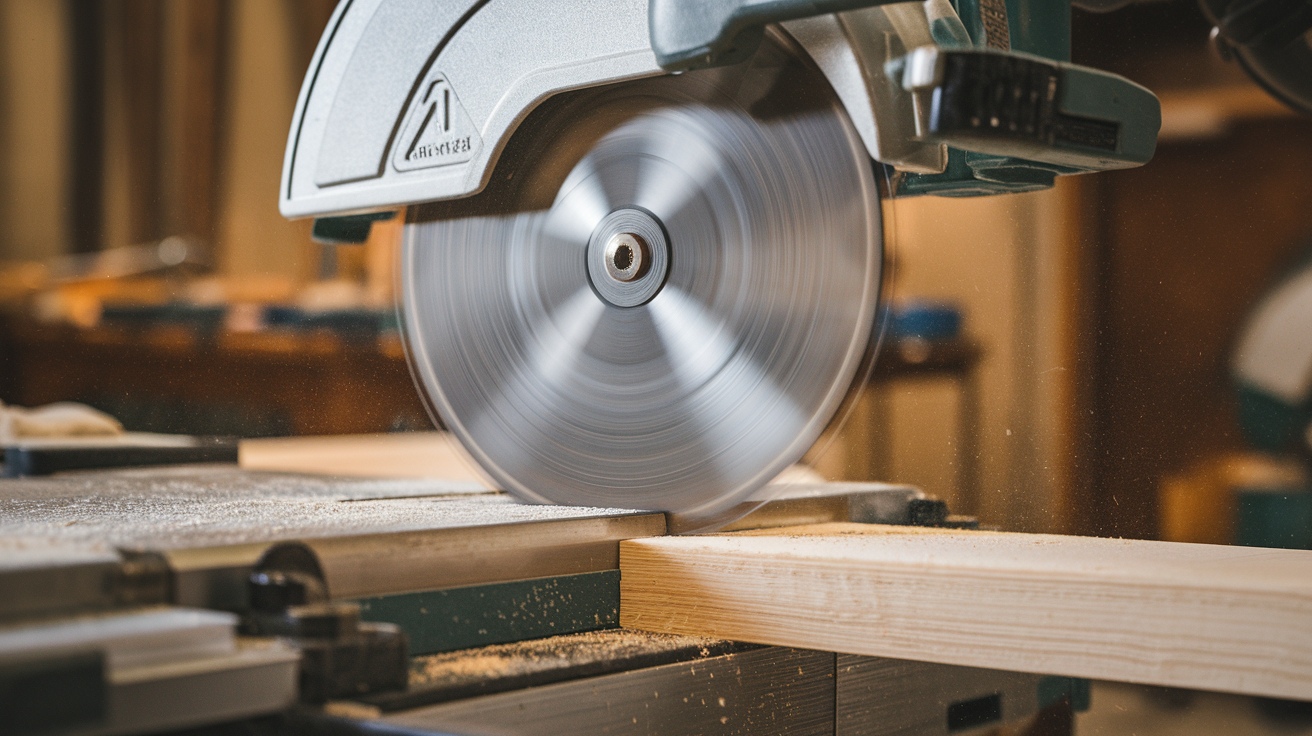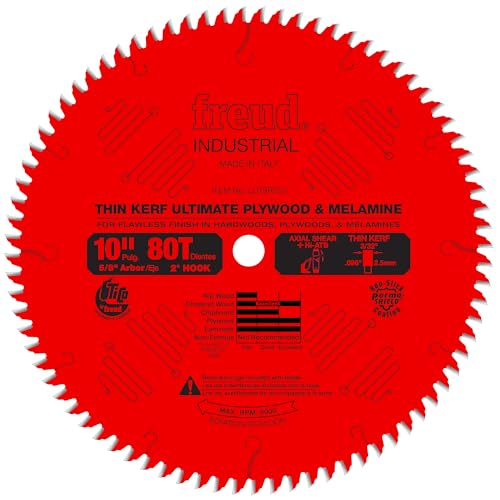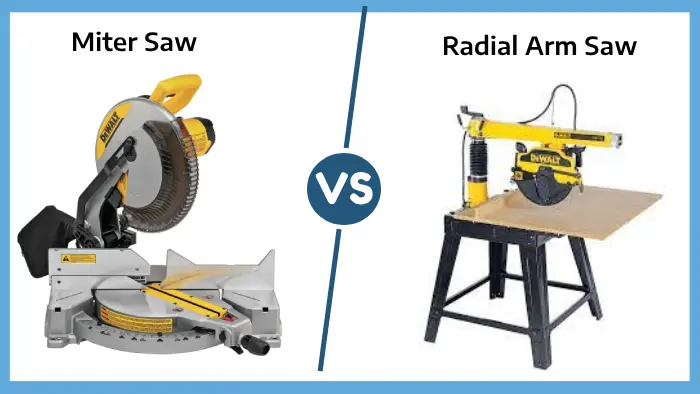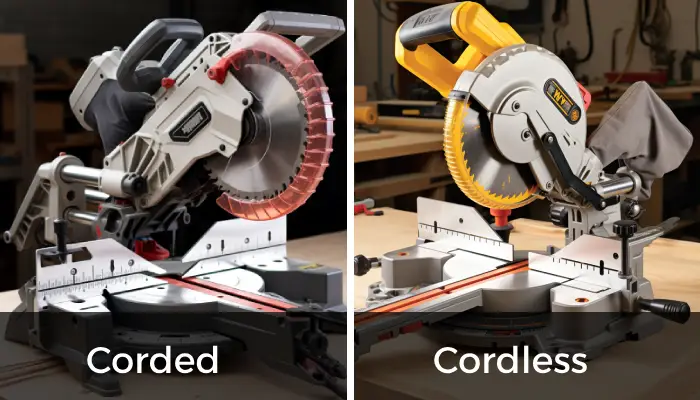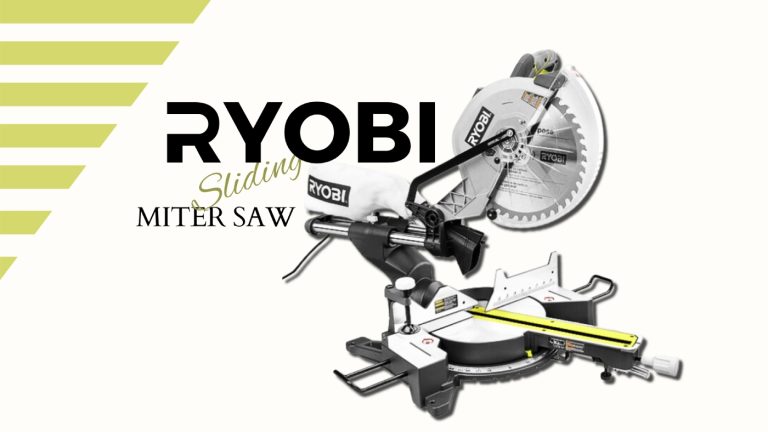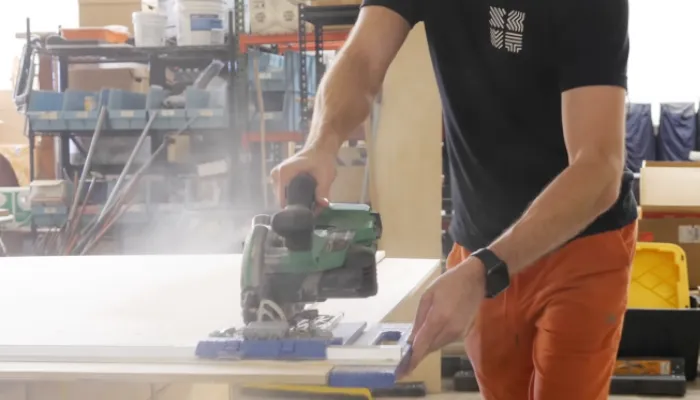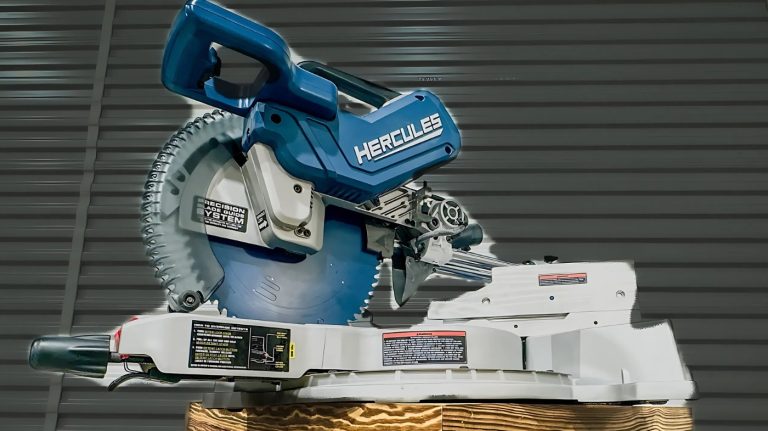Best Thin Kerf Miter Saw Blades: Top Picks for Clean Cuts
If you’re hunting for the best thin kerf miter saw blades for precision cuts in 2025, you’re in luck. The WEN BL1040 and Makita A-93681 are top choices for clean cuts.
The Diablo Saw Blade offers exceptional durability, while the DEWALT 10-Inch blade ensures smooth finishes. WEN’s BL1060 and Freud LU91R008 also stand out for their performance.
Remember, choosing the right blade involves considering compatibility, tooth count, and kerf thickness. Each blade can enhance your woodworking experience by minimizing tear-out and reducing waste. Stick around to discover more about the features and benefits of these blades.
| Image | Name | Editor's Rating | Price |
|---|---|---|---|

|
WEN BL1040 10-Inch 40-Tooth Carbide-Tipp...
|
|
|

|
Makita A-93681 10-Inch 80 Tooth Micro Po...
|
|
|

|
Diablo D1280X: 12" x 80-Teeth Fine Finis...
|
|
|

|
DEWALT 10-Inch Miter / Table Saw Blade, ...
|
|
|

|
WEN BL1060 10-Inch 60-Tooth Fine-Finish ...
|
|
Key Takeaways
- Thin kerf blades, like WEN BL1040 and DEWALT, offer reduced material loss and increased cutting efficiency for precision projects.
- Blades such as Makita A-93681 and Diablo Saw Blade provide exceptional cutting quality with minimal tear-out and splintering.
- Durability is enhanced in blades with carbide-tipped teeth and anti-stick coatings, ensuring longevity and consistent performance.
- Consider tooth count: higher counts yield smoother cuts, while lower counts are better for ripping tasks, affecting overall cutting performance.
- Evaluate compatibility with saw types and intended materials to choose the best thin kerf blade for specific woodworking needs.
WEN BL1040 10-Inch Carbide-Tipped Woodworking Saw Blade
- Featuring a 10-inch diameter (254 mm), a 5/8-inch arbor (15.88 mm) and a rating of up to 6000 RPM
- Perfect for slicing through both hard and softwoods of all kinds
- Ultra-thin 1/10-inch kerf (2.4 mm) provides clean and efficient cuts
If you’re a woodworker looking for a reliable and efficient cutting solution, the WEN BL1040 10-Inch Carbide-Tipped Woodworking Saw Blade is an excellent choice.
With its ultra-thin 1/10-inch kerf, this blade makes clean cuts through both hardwoods and softwoods, like oak and pine. It features 40 carbide-tipped teeth, providing versatility for ripping and cross-cutting.
Users appreciate the balance and reduced vibrations, which enhance overall performance. Rated for up to 6000 RPM, it’s compatible with most 10-inch miter saws, jobsite saws, and table saws.
Best For: Woodworkers seeking an affordable, high-quality saw blade for both ripping and cross-cutting tasks.
Pros:
- Ultra-thin kerf allows for clean and efficient cuts with minimal material loss.
- Versatile design featuring 40 carbide-tipped teeth makes it suitable for various wood types and cutting applications.
- Balance and reduced vibrations enhance cutting performance.
Cons:
- Limited compatibility with saws outside the standard 10-inch size, which may restrict usage for some users.
Makita A-93681 10-Inch 80 Tooth Micro Polished Mitersaw Blade Silver
- PRECISION : ATAF (Alternate Top and Alternate Face) tooth design for ultra precision cutting
- EFFICIENCY : Japanese ultra-thin kerf carbide-tipped design provides smoother cuts with less drag on...
- ACCURACY : Fully hardened and expertly hand-tensioned steel saw plates for true cuts
The Makita A-93681 10-Inch 80 Tooth Micro Polished Miter Saw Blade is an ideal choice for woodworkers seeking precision and versatility in their projects.
Its ATAF tooth design guarantees ultra-precision cuts, while the Japanese ultra-thin kerf carbide-tipped construction minimizes motor drag.
You’ll appreciate its ability to produce clean cuts on various materials, including hardwoods like Jatoba and Hickory, with minimal blade marks.
Users rave about its longevity, staying sharp longer than many pricier options, making it perfect for both DIY enthusiasts and professionals.
This blade excels at crosscutting and is particularly effective for cutting oak trim and laminate flooring. With consistent performance and no gumming issues, it’s sure to become your favorite miter saw blade.
Best For: The Makita A-93681 10-Inch 80 Tooth Micro Polished Miter Saw Blade is best for woodworkers and DIY enthusiasts looking for precision and quality in their cutting projects.
Pros:
- Exceptional cutting quality with minimal blade marks, even on dense hardwoods.
- Long-lasting sharpness that rivals more expensive blades, providing great value.
- Versatile application for various materials, making it suitable for both professional and home use.
Cons:
- Not suitable for heavy-duty industrial applications compared to higher-end models.
Diablo Saw Blade for Wood (12 x 80 Teeth)
- High-performance TiCo Hi-Density carbide specifically designed for each application
- Perma-SHIELD Non-stick Coating protects from heat, gumming, & corrosion
- Super thin laser cut kerf for fast, durable, and clean cuts
For woodworkers seeking precision and clean cuts, the Diablo Saw Blade for Wood (12 x 80 Teeth) stands out as an exceptional choice. This blade features a fine finish and high tooth count, making it perfect for crosscuts in both hardwoods and softwoods.
Its TiCo Hi-Density carbide guarantees maximum durability, while the Perma-SHIELD coating protects against heat and corrosion, extending its lifespan.
The super thin kerf design reduces material waste, allowing for fast and clean cuts. Users rave about its performance, noting minimal sanding is needed when it’s new.
Although it’s slightly pricier, the quality and effectiveness make it a worthy investment for any woodworker aiming for flawless results in their projects.
Best For: Woodworkers seeking precision and clean cuts in both hardwoods and softwoods.
Pros:
- High tooth count (80 teeth) ensures smooth finishes with minimal tear-out.
- TiCo Hi-Density carbide and Perma-SHIELD coating provide durability and extend blade life.
- Super thin kerf design reduces material waste while delivering fast and clean cuts.
Cons:
- Lifespan may be reduced when cutting harder woods like maple or oak.
- May require additional sanding for an optimal finish as the blade wears down.
DEWALT 10-Inch Miter/Table Saw Blade (60-Tooth)
- Thin kerf for fast and smooth cutting action
- Computer balanced plate reduces vibration for improved accuracy and better finish
- Wedge shoulder design puts more steel behind each tip for increased durability and accuracy
Engineered for precision, the DEWALT 10-Inch Miter/Table Saw Blade (60-Tooth) is an exceptional choice for both DIY enthusiasts and professional woodworkers who frequently tackle fine crosscuts.
With its thin kerf design (.095 inches), this blade minimizes waste while delivering smooth finishes on various materials like natural wood, plywood, and wood composites.
The wedge shoulder design enhances durability and accuracy, providing solid support behind each tip. Plus, the computer-balanced plate reduces vibration, ensuring cleaner cuts.
Best For: DIY enthusiasts and professional woodworkers seeking a reliable blade for fine crosscuts in various materials.
Pros:
- Produces smooth finishes with minimal waste due to thin kerf design.
- Durable construction with wedge shoulder design enhances cutting accuracy.
- Highly rated by users for effectiveness on a wide range of materials, making it versatile for home projects.
Cons:
- The 60-tooth count may be less suitable for ripping compared to lower tooth blades.
- Limited to crosscutting applications; not ideal for heavy-duty ripping tasks.
WEN BL1060 10-Inch Professional Woodworking Saw Blade
- Featuring a 10-inch diameter (254 mm), a 5/8-inch arbor (15.88 mm) and a rating of up to 6000 RPM
- Perfect for slicing through both hard and softwoods of all kinds
- Ultra-thin 1/10-inch kerf (2.4 mm) provides clean and efficient cuts
Crafted for both hobbyists and professionals, the WEN BL1060 10-Inch Professional Woodworking Saw Blade delivers outstanding performance with its ultra-thin 1/10-inch kerf design.
This blade features 60 carbide-tipped teeth, making it ideal for cutting through both hard and softwoods like pine, oak, and cedar. You’ll appreciate the clean, efficient cuts without any shredding, ensuring your projects look polished.
Rated for up to 6000 RPM, it maintains stability and generates low heat during use. Plus, it’s compatible with most 10-inch miter saws, jobsite saws, and table saws, enhancing overall performance compared to standard blades.
Best For: The WEN BL1060 10-Inch Professional Woodworking Saw Blade is best for both hobbyists and professionals seeking high-quality cutting performance in woodworking projects.
Pros:
- Ultra-thin kerf design allows for clean, efficient cuts with minimal material waste.
- Compatible with various saws including miter, jobsite, and table saws, enhancing versatility.
- Highly rated for stability and low heat generation, ensuring durability during extended use.
Cons:
- Carbide-tipped teeth may dull with extensive use, requiring periodic sharpening or replacement.
- Not ideal for non-wood materials, limiting its application to primarily woodworking tasks.
Freud LU79R010: 10 Thin Kerf Ultimate Plywood & Melamine Blade
- Flawless Finish Cuts - Designed for ultra-smooth, chip-free edges in veneered plywood, fine...
- Premium TiCo Carbide Blend - Features a high-density TiCo crosscutting blend that maximizes cutting...
- Hi-ATB Tooth Geometry - High Alternate Top Bevel (Hi-ATB) tooth design delivers superior shearing...
Designed for woodworkers who demand precision and quality, the Freud LU79R010: 10 Thin Kerf Ultimate Plywood & Melamine Blade excels in producing splinter-free cuts.
With 80 Hi-ATB teeth and a .098 kerf, this blade smoothly tackles plywood and laminate materials with minimal effort. Its laser-cut anti-vibration slots reduce sideways movement, ensuring a flawless finish while extending blade life.
The premium TiCo HI-Density Carbide blend guarantees longevity and sharpness, while the Perma-Shield coating minimizes drag and protects against corrosion.
Users report significant improvements over stock blades, especially on delicate cuts. Although it may be pricier than alternatives, the performance and quality make this blade a worthwhile investment for both professionals and hobbyists alike.
Best For: Woodworkers seeking precision and clean cuts in plywood and melamine materials.
Pros:
- Exceptional performance with splinter-free cuts on various materials.
- Thin kerf design minimizes waste and cutting resistance.
- Durable construction with premium carbide teeth ensures longevity and sharpness.
Cons:
- May require specific setups, such as track saws or circular saws, for optimal use.
WEN BL1280 12-Inch 80-Tooth Woodworking Saw Blade
- Featuring a 12-inch diameter (305 mm), a 1-inch arbor (25.4 mm) and a rating of up to 6000 RPM
- Perfect for slicing through both hard and softwoods of all kinds
- Ultra-thin 1/10-inch kerf (2.6 mm) provides clean and efficient cuts
For those looking for a reliable and efficient cutting solution, the WEN BL1280 12-Inch 80-Tooth Woodworking Saw Blade stands out with its ultra-thin 1/10-inch kerf.
This blade features 80 carbide-tipped teeth, making it perfect for achieving clean, precise cuts in both hard and softwoods.
You’ll appreciate how it produces minimal tear-out, offering a cutting speed comparable to a 40-tooth blade while maintaining the precision of a 100-tooth blade.
Users have noted its smooth operation and low resistance, making it suitable for various projects, from kitchen installations to furniture.
With its excellent price-to-performance ratio, the WEN BL1280 is a solid choice for amateurs and professionals alike, ensuring you get great value for your investment.
Best For: The WEN BL1280 12-Inch 80-Tooth Woodworking Saw Blade is best for both amateur and professional woodworkers seeking a reliable blade for clean, precise cuts in various wood types.
Pros:
- Produces clean, precise cuts with minimal tear-out, enhancing the quality of woodworking projects.
- Compatible with most miter and table saws, ensuring ease of use for a wide range of applications.
Cons:
- May not be ideal for heavy-duty ripping, as it is designed primarily for fine finishes rather than aggressive cutting.
Freud LU88R012: 12 Thin Kerf Fine Finish Crosscut Blade
- Specs: Arbor 1", Diameter 12", Grind ATB, Hook Angle 15°, Kerf .094", Plate .071", Teeth 80
- Premium TiCo HI-Density Carbide Crosscutting Blend for Maximum Performance
- Positive Hook Angles produce a smoother cut and allow for a faster feed rate
With its thin kerf design, the Freud LU88R012 is an excellent choice for woodworkers who value precision and efficiency in their cuts. This 12-inch blade features 80 teeth made from a premium TiCo HI-Density Carbide blend, ensuring smooth and clean crosscuts through various materials, including hard maple.
The .094-inch kerf minimizes waste and allows for easier feeding, while the 15° hook angle enhances cutting speed. Users appreciate the blade’s quiet operation and superior finish, particularly on sliding miter and table saws.
While some report minor tear-out, it’s easily fixed with sanding. Although it may seem pricey, many find its durability and performance worth the investment, making it a reliable addition to your toolkit.
Best For: The Freud LU88R012 is best for woodworkers seeking high-quality, precision crosscuts in various materials with minimal waste.
Pros:
- Produces smoother cuts with faster feed rates due to its thin kerf design and positive hook angle.
- Made from premium TiCo HI-Density Carbide, ensuring durability and longevity of the blade.
- Operates quietly and delivers a superior finish, particularly on sliding miter and table saws.
Cons:
- Minor tear-out and circular marks may occur, requiring sanding to remedy.
WEN BL1080 10-Inch Carbide-Tipped Woodworking Saw Blade
- Featuring a 10-inch diameter (254 mm), a 5/8-inch arbor (15.88 mm) and a rating of up to 6000 RPM
- Perfect for slicing through both hard and softwoods of all kinds
- Ultra-thin 1/10-inch kerf (2.4 mm) provides clean and efficient cuts
If you’re looking for precision and a clean finish in your woodworking projects, the WEN BL1080 10-Inch Carbide-Tipped Woodworking Saw Blade is an excellent choice.
With its ultra-thin 1/10-inch kerf and 80 carbide-tipped teeth, you’ll achieve smooth, tear-free cuts across a variety of hardwoods and softwoods. This blade performs exceptionally well for delicate tasks, from trimming to cabinetry work, making it versatile for any project.
Users appreciate its stability and low vibration, which guarantees accurate cuts every time. Plus, its durable construction means it maintains sharpness even after multiple uses.
Compatible with most 10-inch miter and table saws, this blade offers professional-quality results without breaking the bank—perfect for both seasoned pros and DIY enthusiasts.
Best For: The WEN BL1080 is best for woodworking professionals and DIY enthusiasts seeking precision and clean finishes in their projects.
Pros:
- Ultra-thin kerf allows for clean and efficient cuts, minimizing waste.
- High tooth count ensures smooth, tear-free edges, reducing the need for sanding.
- Durable construction maintains sharpness over time, providing consistent performance across multiple projects.
Cons:
- Not suitable for cutting very thick materials due to its design.
- Limited to 10-inch saw compatibility, which may not suit all users’ needs.
Freud LU91R008 Sliding Compound Miter Saw Blade
- Premium TiCo Hi-Density Carbide crosscutting blend for maximum performance
- Negative hook angles minimizes climbing for better control
- Thin kerf requires less power and allows for faster feed rate
The Freud LU91R008 Sliding Compound Miter Saw Blade is an ideal choice for woodworkers seeking precision and smoothness in their cuts. This 8-1/2 inch thin kerf blade features a premium TiCo Hi-Density Carbide blend, ensuring maximum performance.
Its negative hook angles reduce climbing, giving you better control. You’ll appreciate how it cuts end grain cleanly, eliminating the need for a shooting board.
The blade produces splinter-free cuts with a glass-like finish, making it effective on both hard and soft woods.
Compatible with DeWALT miter saws, it has garnered positive user feedback for its quiet operation and cutting quality. Just be cautious with the negative hook angle, and check compatibility to avoid sizing issues.
Best For: Woodworkers and DIY enthusiasts looking for a high-quality, precision blade for smooth and clean cuts.
Pros:
- Smooth and clean cuts on both hard and soft woods, with minimal splintering.
- Thin kerf design allows for faster feed rates and requires less power.
- Compatible with DeWALT miter saws, enhancing versatility in various cutting applications.
Cons:
- Negative hook angle may require careful handling to avoid climbing.
- Not compatible with Rockwell Sawbuck Frame and Trim Saw, limiting some users’ options.
DEWALT 10-Inch Miter Saw Blades (2-Blade Combo)
- Tougher tungsten carbide stays sharper longer
- Thin kerf for fast and smooth cutting action and The arbor size is 5/8”.
- Computer-balanced plate reduces vibration for improved accuracy and better finish
Looking for precision and versatility in your woodworking projects? The DEWALT 10-Inch Miter Saw Blades (2-Blade Combo) offers exactly that, featuring a 60-tooth and a 32-tooth blade in one pack.
Constructed with tougher tungsten carbide, these blades stay sharp longer, ensuring clean cuts without tearout—especially with the 60T blade. The thin kerf design provides fast, smooth cutting action, ideal for miter and slide miter saw jobs.
Users rave about the blades’ durability and performance, reporting minimal vibration for improved accuracy. Plus, at a low price point, you get exceptional value for two high-quality blades. Whether you’re a hobbyist or a pro, these DEWALT blades are a solid choice for your next project.
Best For: Woodworkers of all skill levels looking for precision cutting and versatility in their projects.
Pros:
- Durable tungsten carbide construction maintains sharpness for longer, providing clean cuts.
- Thin kerf design allows for fast, smooth cutting action with minimal material waste.
- Great value offered with a two-blade combo pack, ideal for various cutting tasks.
Cons:
- May require regular maintenance to keep blades sharp for optimal performance.
A Complete Guide to Selecting the Best Thin Kerf Miter Saw Blades
When you’re selecting thin kerf miter saw blades, there are several key factors to keep in mind.
Blade Diameter Compatibility
Choosing the right blade diameter for your thin kerf miter saw is important for achieving precise cuts and maintaining the tool’s efficiency.
Most miter saw blades come in standard sizes, with the most common being 10-inch (254 mm) and 12-inch (305 mm). It’s essential that the blade diameter matches your saw’s specifications to guarantee peak performance.
Don’t forget about the arbor size, which is typically 5/8-inch (15.88 mm) for 10-inch blades and 1-inch (25.4 mm) for 12-inch blades. This size is crucial for compatibility with your saw’s mounting system.
Choosing the correct blade diameter not only guarantees a proper fit but also minimizes vibrations, enhancing cutting accuracy.
If you use a blade with an incompatible diameter, you might face improper cutting angles, an increased risk of kickback, or even damage to your saw or blade.
To avoid these issues, always consult your manufacturer’s guidelines or specifications for the right blade diameter.
Tooth Count Importance
Tooth count plays an essential role in the performance of thin kerf miter saw blades, impacting both the quality of cuts and the efficiency of your work.
Higher tooth counts generally yield smoother, cleaner cuts, making them ideal for fine woodworking and finish work where surface quality is paramount.
Blades with 80 or more teeth, especially those designed for crosscutting, minimize tear-out and splintering on hardwoods and delicate materials.
However, finding the right balance between tooth count and kerf thickness is important. While more teeth provide finer cuts, an ultra-thin kerf reduces material waste and requires less power during cutting.
For ripping tasks, lower tooth counts (around 40-60) are suitable, whereas higher counts (70-80+) excel in crosscuts.
Also, consider the tooth configuration, such as alternating top bevel (ATB) or high alternate top bevel (HiATB). These designs can greatly influence cutting performance, with specific configurations catering to different materials and cut quality needs.
Kerf Thickness Considerations
Kerf thickness is an essential factor that directly influences the performance of thin kerf miter saw blades. When you choose a blade, consider that thinner kerf blades usually produce less waste and require less power from your saw.
Ultra-thin kerf blades typically range from 1/10 inch (2.4 mm) to 1/8 inch (3.2 mm), which means they can offer smoother cuts and faster feed rates.
One notable advantage of a thinner kerf is its ability to minimize tear-out and splintering, leading to cleaner edges on both hardwoods and softwoods. If precision is your goal, opting for a thinner kerf can enhance your cutting performance considerably.
However, keep in mind that while thinner kerfs are great for detailed work, thicker kerfs might be better suited for heavy-duty applications where durability is key.
Selecting the right kerf thickness is vital for compatibility with your saw, as well as for achieving the finish quality you desire on various materials.
Material Types Suitable
When considering thin kerf miter saw blades, it’s important to understand the types of materials they’ll handle effectively. These blades excel at cutting both hardwoods and softwoods, delivering clean, precise cuts while minimizing material waste due to their reduced kerf thickness.
If you’re working with delicate materials like plywood or melamine, thin kerf blades shine by minimizing tear-out and guaranteeing a smooth finish.
You’ll find thin kerf blades particularly beneficial for projects like furniture making or trim work. Their design produces less resistance during cutting, allowing for faster feed rates. This is a great advantage whether you’re a professional or a DIY enthusiast.
Additionally, these blades maintain their sharpness longer, which means you won’t have to replace them as often, especially when cutting dense woods like maple or oak.
Durability and Longevity
Choosing the right thin kerf miter saw blade involves looking closely at its durability and longevity. One key factor is the material; blades made from high-density carbide offer superior wear resistance compared to standard steel, ensuring they last longer. Regular maintenance, like cleaning off pitch and resin buildup, can also greatly extend the lifespan of your blades.
When working with particularly hard materials, be aware that the performance of thin kerf blades may decline, which could lead to a shortened lifespan. Keep an eye on this to avoid unexpected replacements.
Additionally, blades featuring anti-stick coatings can help reduce friction and heat, further prolonging their life while maintaining cutting efficiency.
Lastly, consider the tooth count. Blades with higher tooth counts provide smoother cuts but might wear out quicker when cutting dense materials. Balancing the need for smooth finishes with the durability of your blade is essential.
Cutting Performance Expectations
Understanding the cutting performance of thin kerf miter saw blades is just as important as considering their durability. These blades, typically around 0.094 to 0.1 inches thick, offer faster cutting speeds and reduce material waste, making them ideal for various projects.
With a high tooth count—often between 60 to 80 teeth—thin kerf blades deliver smoother finishes and minimize tear-out, especially when you’re working with hardwoods or delicate materials.
The specialized tooth designs, like Alternate Top Bevel (ATB) or high Alternate Top Bevel (HiATB), enhance precision and result in cleaner edges.
You’ll notice less blade drag and reduced motor strain due to their ultra-thin construction, which improves overall cutting efficiency. This means you can tackle delicate cuts and fine finishes more effectively.
Noise and Vibration Levels
Many woodworkers overlook the importance of noise and vibration levels when selecting thin kerf miter saw blades, yet these factors considerably impact your cutting experience.
Thin kerf blades typically generate less vibration compared to thicker blades, which not only improves your cutting accuracy but also reduces user fatigue during extended use.
The design of these blades often includes computer-balanced plates that minimize vibrations, contributing to a smoother operation while you cut. This reduced vibration level offers a more stable cutting experience, allowing for cleaner and more precise cuts on various materials.
Additionally, lower vibration levels can enhance the longevity of both the blade and the saw. Excessive vibrations can cause unnecessary wear and tear on components, leading to more frequent replacements and repairs.
You’ll also find that users often report quieter operation with thin kerf blades, making them a better choice for environments where noise reduction is important.
Frequently Asked Questions
What Is the Difference Between Thin Kerf and Standard Saw Blades?
Imagine slicing through wood like a hot knife through butter. That’s what thin kerf blades offer. The key difference between thin kerf and standard saw blades lies in width.
Thin kerf blades are narrower, resulting in less material being removed during cuts, which means less resistance and smoother operation. This efficiency allows you to tackle delicate projects with precision, while standard blades can be bulkier and create more waste. You’ll appreciate the difference!
How Do I Maintain Thin Kerf Miter Saw Blades?
To maintain your thin kerf miter saw blades, regularly clean them after use to remove resin and debris. Use a soft brush and a suitable blade cleaner, making sure you don’t damage the teeth.
Check for dullness; if needed, sharpen the blades professionally or use a dedicated sharpener. Store them properly in a protective case to prevent damage. Finally, always inspect the blade for any signs of wear before use to guarantee safety and performance.
Can I Use Thin Kerf Blades on Any Miter Saw?
Yes, you can use thin kerf blades on most miter saws, but it’s important to check your saw’s specifications first. Thin kerf blades are designed to reduce waste and provide smoother cuts, making them ideal for precision work.
Just verify that the blade’s diameter and arbor size match your miter saw’s requirements. If you follow these guidelines, you’ll enjoy the benefits of thin kerf blades without any issues.
Are Thin Kerf Blades Suitable for Hardwood Cutting?
Yes, thin kerf blades are suitable for cutting hardwood. They’re designed to reduce material waste and require less power from your saw, making them ideal for dense woods. You’ll find that these blades create cleaner cuts, minimizing the risk of splintering.
Just make sure your miter saw can handle the blade’s specifications, as proper fit is essential for peak performance. With the right setup, you’ll achieve precise and efficient cuts in hardwood.
How Long Do Thin Kerf Miter Saw Blades Typically Last?
Thin kerf miter saw blades typically last anywhere from 20 to 50 hours of cutting time, depending on the material and usage conditions.
If you’re cutting softer woods, you might get more life out of the blade, while harder materials can wear it down quicker. Regular maintenance, like cleaning and proper storage, can also extend its lifespan. So, keep an eye on your blade’s performance to guarantee ideal results during your projects.
Choose the Perfect Thin Kerf Miter Saw Blade and Achieve Flawless Cuts Every Time
In summary, choosing the right thin kerf miter saw blade can make all the difference in achieving those flawless cuts you crave. With a variety of excellent options available, it’s like having a toolbox full of precision at your fingertips.
Remember to take into account factors like tooth count and material compatibility to find the perfect match for your projects.
With the right blade, you’ll slice through wood like a hot knife through butter, elevating your craftsmanship to new heights.
- Featuring a 10-inch diameter (254 mm), a 5/8-inch arbor (15.88 mm) and a rating of up to 6000 RPM
- Perfect for slicing through both hard and softwoods of all kinds
- Ultra-thin 1/10-inch kerf (2.4 mm) provides clean and efficient cuts
Last update on 2026-01-27 / Affiliate links / Images from Amazon Product Advertising API

